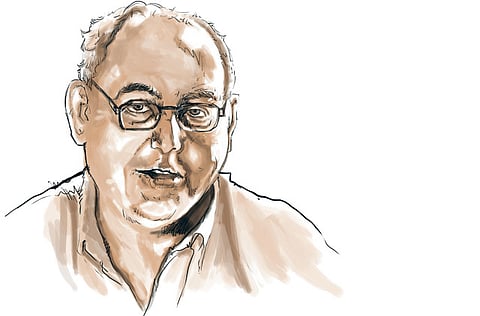A legacy of scholarly work and common sense
Halliday refused to generalise about the Middle East and insisted that its religion, nationalism and revolutions be studied as any region

The passing of Fred Halliday, the renowned academic and Middle East scholar, has come as a shock to his students and his readers alike.
Halliday once said that he did not want to be remembered as someone who never changed his mind, who was always true to his principles. However, there is one strand that runs through all of his work: a refusal to generalise about the Middle East, or to see its politics simply as a reflection of Islam, or the Arab mind, or any other such abstraction. If there is one thing to take home from his life's work, that is probably it.
In his book 100 Myths about the Middle East (he regretted having to limit himself to only one hundred), myth number one was that "the Middle East is, in some fundamental way, ‘different' from the rest of the world and has to be understood in terms distinct from other regions". For that reason, he was instinctively wary of phrases such as ‘Islam and the West', ‘the clash of civilisations', ‘imagining the other' and, in fact, almost anything with ‘imagining' in the title. What about the money, the social forces, the historical processes?
Although an exceptional Middle East expert, Halliday insistently and consistently argued that the religion, nationalisms and revolutions of the Middle East should be studied not as an exception but a region like any other part of this complicated world. Many accounts of the critical events in the region still fall in the trap of exceptionalism whereas Halliday recommended reading history of Latin America and political theory to understand the Middle East.
Deep research
By immersing himself in the Middle East, be it through living here for several years or mastering both Arabic and Farsi, Halliday earned his right to analyse this part of the world and be critical of it when he saw it fit, including in heated debates on Al Jazeera. His books were a mine in terms of empirical facts and field evidence. Nobody has ever equalled his knowledge on the quite enigmatic, often neglected South Yemen; how did he come to know so well the lives of the Yemeni coal miners in Sheffield? This was his talent as a tireless researcher.
Much of his work was on the academic discipline of International Relations (IR) Theory. But while he sometimes took the discipline to task for lacking historical awareness, he also knew how to take the discipline with a pinch of salt. Paraphrasing Marx, he once said that all events happen three times: first as tragedy, then as farce, then as IR Theory.
Halliday also insisted on the need for IR to change itself, to open up to the advances of other disciplines, most notably history and historical sociology. Indeed, Halliday wrote in all the key forums and book editions that revolutionised the discipline from this angle. His seminars and supervisions at the London School of Economics gave birth to a whole new circle of IR scholars who are continuing his approach at prominent institutions throughout the world. In this regard, we are lucky. His key struggles in the discipline were productive and constructive.
Being a student of Halliday was indeed a privilege. He was never too generous with his insights on political and social issues, and often preferred to enlighten his students using anecdotes and examples rather than just historical references and theory.
For instance, when asked whether the Israeli-Palestinian issue was the cause of the other problems in the region, he answered that the issue was a bit like a pain in the back, which he was suffering from at that moment: it brought out all sorts of other pains all around the body, but did not cause them. Because he was so accessible, his students got the opportunity to challenge and be challenged by him. He could relate to new views and thoughts and was always motivated by a strong sense of personal commitment, rather than hiding behind academic neutrality.
His brilliance lay in the fact that he always kept a theoretical distance from the entangled realities of the Middle East. He had a rare, lucid vision of academia, its role and limits, its relations with power, politics or finance. True to his principles of uncompromising intellectual honesty, true to his beliefs in human values, he left a legacy both of scholarly work and of common sense: he once remarked that the ‘best things in life are free, which is why people tend to forget them so easily'. His lifelong dedication to informed and sound scholarship, and his relentless analysis of the world we live in, are a gift that will never be forgotten.
Comparative method and historical sensitivity and a balanced explanation of the particularities of an event and — as he liked to say — the world historical moment of that event, these were his weapons against superficial readings of a region that is often the topic of shallow comments. These and his attachment to the region, which he described as critical solidarity, will remain as a guideline for students of the Middle East.
He was never fond of ready-made dogmatic explanations and neither should we be.
The writers of this article were students of Fred Halliday.



